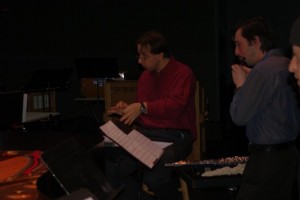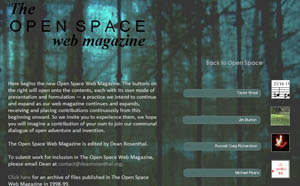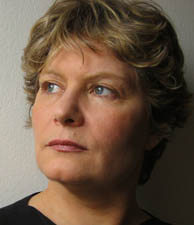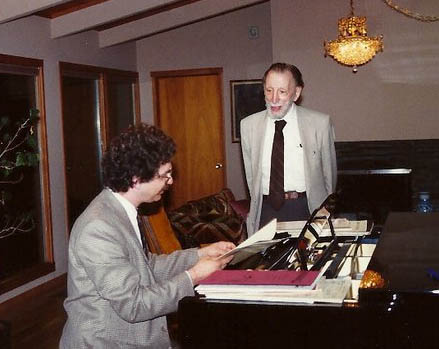 Conductor Steven Dennis Bodner, who was a passionate, fiery, radical force for new music, died tragically on Monday night after a brief illness. Steve was a fanatically devoted new music performer and advocate, who helped develop a new appreciative audience for this music during his tenure as conductor of the Williams College Wind Ensemble and the Opus Zero Band, the college contemporary music group which he founded. He was a man of incredible depth, joy and energy whose early death is not only a great personal loss to those who knew him but is an immesurable loss to the contemporary music field, where Steve would have had a wider influence if fate had not intervened.
Conductor Steven Dennis Bodner, who was a passionate, fiery, radical force for new music, died tragically on Monday night after a brief illness. Steve was a fanatically devoted new music performer and advocate, who helped develop a new appreciative audience for this music during his tenure as conductor of the Williams College Wind Ensemble and the Opus Zero Band, the college contemporary music group which he founded. He was a man of incredible depth, joy and energy whose early death is not only a great personal loss to those who knew him but is an immesurable loss to the contemporary music field, where Steve would have had a wider influence if fate had not intervened.
As Daniel Wakin reported today in the NY Times, Alan Gilbert has been announced as the incoming Director of Conducting and Orchestral Studies at the Juilliard School. He replaces James DePriest, who will remain on the faculty as Principal Conductor and Director Emeritus. Gilbert will also get some help from James Ross (currently at the University of Maryland), who will serve as his assistant, providing a “more permanent presence” than that of a frequently touring maestro.
Gilbert plans to integrate his work at the New York Philharmonic, where he assumed the post of Music Director in 2009, with his teaching duties at Juilliard. According to the Times article, he will require conducting students to attend rehearsals and will allow them opportunities to meet with members of the orchestra and undertake internships at the Philharmonic.
I’m of two minds about this. I think it will be a tremendous opportunity for Juilliard students, both conducting and performance majors. Gilbert has already shaken things up at the Phil, frequently in ways that have benefited contemporary music. Juilliard may grow in as yet unforeseeable ways as a result of Gilbert’s energetic presence and vision.
On the other hand, as we’ve seen recently with James Levine’s experiences at the Boston Symphony and the Metropolitan Opera, spreading oneself too thin can create problems at both of one’s organizations. While conductors routinely juggle multiple appointments, both of these are high profile and demanding positions. I’m not saying Gilbert can’t manage them, but it’s at least cause for concern. Also, I’d imagine that aspiring orchestra musicians attending graduate school at NEC, Eastman, and other major conservatories are gnashing their teeth at what they may perceive to be too cozy a relationship going on at Lincoln Center.

On Tuesday 1/11, newish New York vocal ensemble Ekmeles presents a program of music by Martin Iddon, Alvin Lucier, and David Lang at The Tank. I caught up with Ekmeles’ director, baritone Jeff Gavett to learn more about the event.
Carey: Why did you form the group Ekmeles?
Gavett: “While New York is home to many exceptional instrumental groups dedicated to contemporary music, there is a relative paucity of new vocal music. Ekmeles was created to fill the gap, and bring adventurous new music for solo voices to audiences that otherwise have little or no chance to hear it.”
“Our first season so far has included a US premiere by Mauricio Kagel, New York premieres by Aaron Cassidy and Kenneth Gaburo, and new commissions by Troy Herion and Jude Traxler. We also performed as the vocal complement in a sold out performance of Knee Plays from Einstein on the Beach as part of the Darmstadt Essential Repertoire series at Issue Project Room.”
Carey: Tell us about the works on the concert?
Gavett: “First on the program is our commission, Martin Iddon’s Ἁμαδρυάδες (hamadryads). It’s a transformation of Josquin’s Nymphes des Bois which involves retuning the intervals of the original in chains of Pythagorean intervals. These pitches, notated to the hundredth of a cent, are traversed mostly through extremely slow glissandi, requiring the singers to use sine wave reference tracks to achieve the tuning. We’ll also be playing tuned wine glasses, which blend eerily with the vocal textures.”
“Next is Alvin Lucier’s Theme, a setting of a poem by John Ashbery which shares some kinship with his most famous work. Lucier fragments the poem and distributes it between four speakers, who read the text into what he calls “resonant vessels.” These are vases, milk jugs, any empty container into which is placed a miniature microphone, which picks up the sound of the voice as filtered by the vessel, much like the room filters the sound of Lucier’s voice in I am sitting in a room.”
“David Lang’s the little match girl passion rounds out the program. As the title suggests, Lang has taken Hans Christian Andersen’s moralistic children’s story and infused it with the Passion. The suffering and death of a poor little girl is thus directly and explicitly equated to that of Christ, amplifying the story’s emotional impact. The singers all play percussion instruments, and the glockenspiel is featured especially prominently, its crisp attack evoking the freezing night. The clear and sparse textures throughout the match girl text are contrasted beautifully with richer quasi-choral textures in the Passion-derived elements.”
Carey: What’s next for Ekmeles?
Gavett: “Upcoming performances include John Cage’s Song Books at the Avant Music Festival on February 12th, and Chris Cerrone’s Invisible Cities with Red Light New Music in May.”
Concert Details
Tuesday, January 11th, 2011, 7 PM – Ekmeles – Resonances
$10 admission
The Tank
345 W 45th St, Manhattan, NY 212-563-6269
[Noted composer/performer Bunita Marcus asked to share some information on her upcoming lectures on Morton Feldman.]
I am doing two lectures on Morton Feldman’s Notation and Compositional Process here in NYC this coming January 16th and 23rd at 1:00 to 3:00 pm. These lectures will also be available via Ustream.tv for people outside of NYC.
These lectures are unique audio/visual powerpoint presentations. The first lecture is on the influence of Rugs and the Visual Arts on his Composition and Orchestration. The second lecture is a closer look at his Rubato Notation and his Compositional Process, examining the vellums and manuscripts. I will also discuss the ramifications of this type of notation for the future of contemporary music. I have been lecturing on this subject for 24 years, but unfortunately very few people understand how Feldman went about putting a composition together. I have not published this information anywhere in this much detail. If you are at all interested in Feldman’s compositional process and how he notated his music, this will be an essential introduction. As most of you know, Morton and I composed together for over seven years–a crucial seven years–where he solidified his notation and compositional process in the late works.
I would like to invite anyone interested to attend. I have set it up so that anyone with access to a computer can watch it live. We are trying to make the internet participants able to ask questions via chat. I will be addressing the issues surrounding the vellum scores that Morty created and the problems that have arisen when Universal engraves a score and loses this information. This will be of particular interest to anyone doing research into Feldman’s work. Morty created some of the most interesting and ingenious notation in his late period and we will look at that in detail and it’s implications for the future of contemporary and common-practice music. The lectures are really sequential and I urge you to see both for the best comprehension.
The space in NYC is somewhat limited, so I do encourage you to get your tickets soon and reserve a seat. From the way things look now it will sell-out. There is also great interest in the live internet feed and there is no limit to how many people can use this. But for my sake, please don’t wait until the last moment, try to order the tickets at least 4 days ahead of time. If for some reason you are interested but cannot make either form of the lectures, please do send me an email (b@bunitamarcus.com) and I will put you on a list to keep you updated on future lectures, and a DVD I have in the works.
Feel free to pass on this news. It’s about time we started to clear the air concerning Feldman’s contributions to music. The more people understand what he was doing, the more interesting it becomes. Even though we worked together for many years, my music is nothing like his–except in one way: I adopted and adapted his notational ideas. And in all my years of teaching composition, I have learned that his notational ideas work with any type of music. This I find amazing. It gives me hope for a contemporary music that is accessible to traditionally-trained classical musicians. It is no longer necessary to be a specialist in contemporary music in order to play it. Feldman’s notation shows us the way. It is a composer’s solution, as it should be.
Remember, anyone, anywhere with a computer can log-on and participate, this is not just for the US, it is world-wide. You just need to order tickets to get the correct URL for the lectures.
I will be demystifying Feldman to the degree that one can do so.
I hope to see you there!
Bunita Marcus
Ph.D. Music Composition
www.bunitamarcus.com
Faculty:
If you have composition students please let them know about these lectures.
There is plenty to learn here, especially about composition and notation.
You can buy the tickets (discounts for students, seniors and limited income) here:
http://www.bunitamarcus.com/shop.html
Location:
1-3 pm, Jan. 16th and 23rd, 2011 in Tribeca, NYC
Piano Magic, 78 Reade Street #5E (corner of Church), 10007
(This is a four flight walk-up on Sundays)
1, 2, 3, A, C at Chambers St.; 4, 5, 6, R at City Hall
Piano Magic: 212-732-8828
Bunita 347-715-6518
Also on Facebook:
 …Though it never really closed… Started around 1998 in upstate New York by a small group of musicians including Benjamin Boretz, Mary Lee Roberts and Arthur Margolin, The Open Space was conceived as print and online magazine venture and CD publisher dealing with contemporary music as “…output from a community for people who need to explore or expand the limits of their expressive worlds, to extend or dissolve the boundaries among their expressive-language practices, to experiment with the forms or subjects of thinking or making or performing in the context of creative phenomena. We want to create a hospitable space for texts which, in one way or another, might feel somewhat marginal — or too ‘under construction’ — for other, kindred publications.”
…Though it never really closed… Started around 1998 in upstate New York by a small group of musicians including Benjamin Boretz, Mary Lee Roberts and Arthur Margolin, The Open Space was conceived as print and online magazine venture and CD publisher dealing with contemporary music as “…output from a community for people who need to explore or expand the limits of their expressive worlds, to extend or dissolve the boundaries among their expressive-language practices, to experiment with the forms or subjects of thinking or making or performing in the context of creative phenomena. We want to create a hospitable space for texts which, in one way or another, might feel somewhat marginal — or too ‘under construction’ — for other, kindred publications.”
Given that they may have jumped into the pool just a tad early web-wise, and given the loose nature of of the project along with the busy and evolving schedules of the editors, The Open Space has tended to offer up things in spurts; the print magazine’s last issue was from late 2009, and the website languished for quite a while. Still, as befits an “open space” there has always been a very interesting accumulation of various article, scores, recordings and sound files available on their site, well worth a contemporary musician’s time to sift through. You can order CD recordings and back copies of the print magazine right from the site, as well.
Just last year, composer Dean Rosenthal signed on to get the purely digital webmagazine up and running again, and Dean’s happy to announce the first “issue” is online and available. The current form is a collection of contributions from various composers, of streaming recordings/video of selected works, some coupled with notes and scores of the piece. First offerings include such outside-the-mainstream luminaries as Michael Pisaro, Henry Gwiazda, Richard Coldman and Howard Skempton and others. And of course Dean is always happy to recieve submissions from you composers/performers out there, so why not give it a shot and help populate that open space with even more art and exploration!
[vimeo http://vimeo.com/12767232]
(Visual Abstract, First Movement, Music by Pierre Jalbert, Film by Jean Detheux)
On January 8th, 2011, at 7:30 p.m. in Zilkha Hall of The Hobby Center for the Performing Arts, the Houston TX new music group Musiqa presents Real and Imagined – a concert collaboration with Aurora Picture Show featuring Theo Loevendie’s Six Turkish Folk Songs as well as music by Eve Beglarian, Paul Frehner, and Evan Chambers. Houston-based composer Pierre Jalbert’s Visual Abstract for flute, clarinet, violin, cello, piano, and percussion will be performed live to a film created by Jean Detheux. The concert will be conducted by Houston Symphony Assistant Conductor Brett Mitchell.
Led by five composers (including founding member Pierre Jalbert) Musiqa is receiving a great deal of notice for its innovative multi-disciplinary concert events (dance, visual art, and theater are always integrated into Musiqa performances) as well as its educational programming that annually reaches thousands of Houston area students. Next season, Musiqa will celebrate its ten-year anniversary.
Pierre Jalbert graciously responded to a few questions about Visual Abstract:
Chris Becker: Did Jean Detheux create his film before, after, or during the composition of Visual Abstract?
Pierre Jalbert: He created the film after the piece was written. The music was commissioned and premiered by the Pittsburgh New Music Ensemble a few years back. Jean and I worked on a project last year in which he created a film first and I wrote the music to the film. That work was entitled L’œil écoute (The Eye Listens), and was also premiered by PNME. This time around, we decided that we would reverse the process, and he would do his film to the already existing music.
Chris Becker: In performance with the film, is the conductor watching the film for the timing of some of your musical events? I’m thinking of the third movement where rhythmic hits coincide with abrupt changes in the film.
Pierre Jalbert: Yes, the conductor is looking at the film for cues from time to time, and we rehearse many times through to get the timing down. As you can imagine, it’s very difficult as each performance is slightly different. But Jean made the film to not have too many abrupt changes. But still, there are a a few that make it challenging.
Chris Becker: The layers of images in Detheux’s film are very rich and tactile. They remind me of natural phenomena, weather, or even what we “see” when we close our eyes and listen to the sounds around us. Speaking as a composer, what do you think makes an “abstract” work of visual art successful?
Pierre Jalbert: I think when one looks at the film and hears the music as a single entity, and one does not dominate over the other, but each enhances the other, then we have something interesting.
Chris Becker: Next season, Musiqa will celebrate its ten-year anniversary. As one of the people who founded the organization, how does it feel to look back on all Musiqa has accomplished?
Pierre Jalbert: It’s amazing to look back and see how the organization has grown. I remember a few of us meeting at Tony Brandt’s house 10 years ago and brain-storming about what the organization could be. We wanted to get new music out into the community and into downtown and offer up repertoire that wasn’t being heard in Houston. All of the composers on the Artistic Board work really well together (Anthony Brandt, Karim Al-Zand, Rob Smith, Marcus Maroney, and myself), and that has been crucial in keeping things going through the years.
Tickets for Real and Imagined – including discounted tickets for seniors and students – are available for purchase on the Musiqa website.
Here’s how Phil Kline celebrates the holidays, with a moving installation “boombox” symphony.
Unsilent Night festivities took place in a number of venues in 2010 as well: keep an eye out for videos on YouTube.
Getting ready to enjoy all those new, happy/shiny Xmas presents, I’m sure… Well, here’s another that won’t cost you a dime:
S21’s WPRB-favorite-son, announcer Marvin Rosen, is getting a jump on the upcoming Alan Hovhaness centennial with a 24-hour marathon broadcast of Hovhaness’s music (that’s Marvin above, in 1992, with Hovhaness at the composer’s home). “Mountains and Rivers Without End” begins Sunday, Dec. 26th at 7pm, and will feature more Hovhaness than you can shake a stick at (I know more than a few composers who might well be furiously shaking that stick, but I myself am pretty partial to this American original). Two guests during the marathon will be clarinetist and conductor Lawrence Sobol (December 26, evening), and pianist Sahan Arzruni (December 27, early afternoon) both of whom have recorded the composer’s music. In the New York/New Jersey area you can tune to WPRB at 103.3 FM, while the rest of can stream it all live online.
Marvin is about as well-positioned as anyone to lead you through Hovhaness’s vast output; his doctoral dissertation was on Hovhaness’s music; he was a friend of the composer for many years and spent two weeks in Seattle working with him on his piano music in preparation for the first of two recordings on the Koch International Classics label. Marvin also wrote the liner notes for other Hovhaness recordings on the Koch International Classics label as well. And Marvin has one of the most extensive rare collections of Hovhaness’s music both on CD and LP, so there are bound to be many treats heard. So turn out to tune in, and give Marvin some virtual caffeine support through the long night and day!
 It’s not uncommon to see articles both decrying the sad state of affairs in classical music as a whole as well as celebrating the new opportunities that are available for both composers and performers with the right amount of musical and entrepreneurial skill, luck and perseverance. A prime example of one that covers both issues was recently published as a transcript of a speech given by the Guardian’s Tom Service with the intentionally controversial title “So long, and thanks for all the noise: 2010 and the end of musical history”. Well-spoken and thoughtful (and without the acidity of many critics from across the pond), Service writes:
It’s not uncommon to see articles both decrying the sad state of affairs in classical music as a whole as well as celebrating the new opportunities that are available for both composers and performers with the right amount of musical and entrepreneurial skill, luck and perseverance. A prime example of one that covers both issues was recently published as a transcript of a speech given by the Guardian’s Tom Service with the intentionally controversial title “So long, and thanks for all the noise: 2010 and the end of musical history”. Well-spoken and thoughtful (and without the acidity of many critics from across the pond), Service writes:
My sense is that many young composers now realise that the game is up, that the conventional paths to fame and, er, fortune in contemporary classical culture just aren’t worth the candle. Instead, they’re better off on their own, not least because their music doesn’t fit the line-ups of an orchestra, or even the 1 to a part ensembles of the Sinfonietta, or the Birmingham Contemporary Music Group, or Liverpool’s Ensemble 10:10, or Manchester’s Psappha – a line-up and repertoire whose time has probably also come, has also become a living history more than something genuinely contemporary. Composers still need to make choices, of course; being open to the rest of the world does not guarantee the creation of great, or even good art in an of itself, and they will have to find their own limitations, draw their own lines in the shifting sands of musical culture. But composing without the fear of traducing the absurd unwritten laws of modernist composition will only be a good thing. Like Reich and Glass before them, today’s composers have the chance to build their own communities of listeners and audiences – whether in the flesh or on-line – and make the music that matters to them for people who care about it – and actually enjoy it.
Service brings up many good points and pulls no punches, laying responsibility on the future of new/concert/art/whatever music (rightly so) at the feet of the composers both young & old as well as the performing and academic institutions that help to foster contemporary musical art. In my own opinion, the idea that it’s perfectly legitimate to use whatever medium/style/technique that allows a composer to bring his/her voice into being has been growing and gaining momentum for years now, and more articles like this are surely in store. What has not yet been discussed nearly enough – and this may take quite some time – is the ramifications of our ever-increasingly “big-tent” art form on both those who create and those who analyze and interpret those creations. I can see where Service is coming from with his suggestion of the “end of musical history” as it has been characterized up till now, though I’d prefer the “beginning of a new musical history” myself.
Read the rest here.

